Sindhu Desh was born with the birth of Mother Earth. Our attachment with it, too, is as old and ancient as that. As the days pass into nights and the seasons change, man, observes his regime of wakefulness and sleep and register the effect of the change. Like individuals, the peoples also have their cycles of hibernation and soulfulness of life and activity. At certain times of their history, they rise and took some giant steps on the road to civilization heights, and putting a mile stone or two on the path, they slow down and then step aside to catch breath some times even slide down dangerously and wait quietly for the chance to rise and get the way again.
Sindhu Desh is the land of the people, noted for their ancient civilization and culture. They have had a remarkably magnificent past. For some period in their recent history, they hose to forget their status as a people and fell into a regret able bout of slumber, and permitted themselves to be overrun and ruled by alien peoples.
We, the present generation of the people of Sindhu Desh are the product of that hapless period of our history.
After separation of Sindhu from Bombay Presidency in India in 1936 when we found our political freedom, economic prosperity and cultural growth check mated at home, we over reacted, and largely misconceiving the situation, held the Hindu vested interests, to be responsible for it. Consequently, we chose to see the solution of the situation in the establishment of Pakistan the land of the holy (Muslim) people.
It is said, "the path to bell is paved with good intentions". We too strove to gain Pakistan, with a view to attaining the following objectives:
- Establishment of separate states of the local Muslim peoples in the Muslim majority areas in the Indian sub continent, in order to provide them with full opportunities for progress and development, in accordance with the ways and traditions of their life.
- Promotion and establishment of mutual co operation among such separate Muslim states in order to ensure their political freedom, economic prosperity, and cultural growth. We have now expended full twenty-seven years on this experiment. We should now be in a position to appraise the performance and measure the fulfillment.
ESTABLISHMENT OF SEPARATE MUSLIM STATES Muslim rulers held their sovereignty over a large part of the Indian sub continent, for a great number of years although; almost entirely this rule was personal and tribal.
Under these ruler ships, certain classes and coteries of Muslims, almost exclusively belonging to the non Indian descent who arrived in India with or in the wake of the invading armies, established their vested interests as land owning gentry or officials in government establishments. The Maulvi, the Pir, the feudalist and the mandarins, constituting themselves as serving Muslim aristocracy and who benefited the most under these personal tribal seats of power, found their privileged position better ensured and protected in calling these establishments the Muslim States or better still, the Islamic States.
The Muslim aristocracy, thus entrenched, adopted two positions, choosing one or the other as it suited their purpose, for safe guarding their social, economic and political hegemony in India.
First, as later in the period of Mughal Imperial Rule, they would exert to preserve the vested interests by basing the State Power on semi settler foundations seeking help and support both of the Muslim and the Hindu powerful tribes. This approach, speaking in broad terms, worked, to an extent to the benefit of both the Hindu and the Muslim communities and easily won a considerable measure of popular acceptance in the sub continent. In course of time, however, this approach proved a failure. Solely because of the element of mistake, inherent in its basic formulation viz., joining religion with politics, under a patronizing show of impartiality, for purposes of States administration.
Second, on failure of the semi secular approach, the Muslim Aristocracy sought to protect and enlarge their vested interest by building exclusive Muslim domination in the affairs of State, basing all State Power on theocracy, throwing out secular politics completely out of the field. This could evidently lead to disaster, as it actually did, under the realities and in the steady awakening of political atmosphere and social and economic life in the sub continent.
The British power, armed with superiority's gained from Industrial Revolution back at home, soon walked in, and established its thorough imperialist domination in the subcontinent. The Muslim aristocracy, left high and dry, found it self divided into two camps. One consisted of those who sought to dislodge the British and restore the Mughal rule with the support of the outside friendly Muslim powers and the local Hindu Chieftains. That move, however, failed on the fields of the war of liberation of 1857, and its leading members had to suffer terribly in the cause. The other group sought to save and maintain their privileged positions and vested interests secured by them during the Mughal days, by collaborating fully and unconditionally with the alien imperialist British Raj.
Some time later, when the British imperialists, under pressure of the rising public opinion in India and the world opinion generated under the two world wars conditions started offering political reforms to the people of India on democratic basis. This last group of the upper class Muslim Collaborators fearing injury to their class interests under democracy, first strove to protect the same by consolidating and further expanding areas of their collaboration with the British. However, on seeing the freedom movement gathering momentum and advancing irresistibly, they revised their policy, and with the help and support of their British masters, started movement for establishing sovereign independent states in the Muslim majority provinces, in an arrangement superlatively called Pakistan.
The Muslim upper classes of the Muslim majority Provinces did not apprehend any challenge to their vested interests in conditions of democratic political freedom. These and the common Muslims in those Provinces were, however incited to join the movement for Pakistan by holding out to them temporizing prospects of :
- Establishment of independent sovereign Muslim states in their Provinces.
- Introduction of a way of life in those states in full accord with the injunctions of Islam and holy traditions of the Prophet.
- Freedom of the Muslims of these Provinces from the real or imaginary economic domination of the non Muslims, i.e., the Hindus; and
- Establishment of Unity of all the Muslim Countries, with Pakistan as the hub center of the chosen brotherhood.
For the attainment of these tantalizing objectives, the Muslim vested interests in the Muslim minority Provinces invented the theory of separate nationhood of Muslims. This theory of the nation had its basis solely on considerations of religion. And although, none of the people in any Muslim Country of the world believed in any such theory, the Muslim masses of Sindh, Baluchistan, Pakhtoonistan, and Bengal were soon taken in under the lavish use of Islam's name as an adulatory brief for it. They could not foresee the price they were to pay for the dubious privilege of being termed a nation on basis of religion. They could not realize in time the utter barrenness of the theory both in terms of any national gain or even as a leverage for attaining Islam's power and glory in the world. They were swept completely off their feet in the exuberance of religious favor, remaining utterly oblivious of their fate as victims of the cruel hoax. Some of us who all the time remained conscious of the national distinctness of the People of Sindh and of their significant past history, participated in the movement for Pakistan solely for the purpose of ensuring thereby political independence, economic prosperity and cultural advancement of Sindh. We remained convinced throughout of the validity of the teaching of our great political thinkers like Maulana Obaidullah Sindhi, Allama I. I. Kazi and others who considered the Sindhi people a separate nation. In spite of these convictions, if we joined hands with advocates of the religious nationality theory, who in fact clandestinely strove only to establish the Muhajir Punjabi exploitative hegemony over the Muslim majority provinces. Our sole reason for such a participation was the most unambiguously declared objective of the Pakistan movement, as defined in the 1940 Lahore Resolution of the Muslim League, to found "Independent and Sovereign States" in the Muslim majority Provinces in the sub continent. Mr. Jinnah, when questioned, soon after at his press conference in Madras as to the meaning and effect of the above words in the Pakistan Resolution, most unequivocally declared that "Punjab, for example, will be an independent and Sovereign State"
It was Khan Abdul Ghaffar Khan and his group of workers only, in the Muslim majority areas, whose even in those days, could see through the game and did not get into the trap of the "Two Nation Theory", which the dying Muslim privilege in India was trumpeting about for salvaging its sinking fortunes in Indian life.
At the start, we here in Sindh, participated in the Pakistan movement, under the leadership of Shaikh Abdul Majid Sindhi, on the basis of the theory of separate Muslim nationhood, but soon after we ourselves could see through the class intentions of the Muslim Vested interests of the Muslim minority Provinces and those of our own exploitative Muslim elements who joined with them for the fool hardy and shortsighted purpose of gaining sole positions of power and privilege locally at the cost of their Hindu rivals. Realizing the above, we parted company and came out of the Muslim league.
Pakistan came into existence on August 14, 1947. At the inaugural session of the Constituent Assembly of Pakistan Mr. Mohammed Ali Jinnah, Pakistan's founder and its first Governor General, made a declaration. That was timely, appropriate and the most devastating in importance in the context of the two nation theory on the basis of which the Muslim League, under his own Presidentship, fought for the partitioning of the Indian sub continent and establishment of Pakistan. This declaration of Quaid-e-Azam stands as a complete and most decisive rebuttal of the theory of nation on basis of religion, over which Pakistan was founded. Following is the ad verbatim report of the speech as officially published.
"Now if we want to make this Great State of Pakistan happy and prosperous, we should wholly and solely concentrate on the well being of the people and specially of the masses and the poor. If you will work in co-operation forgetting the past, burying the hatchet, you are bound to succeed. If you change your past and work together in a spirit that every one of you no matter to what community he belongs, no matter what relations he had with you in the past, no matter what is his color, cast or creed, is first, second and last, a citizen of this State, with equal rights, privileges and obligations, there will be no end to the progress you will make."
"I cannot emphasize it too much. We should begin to work in that spirit and in course of time all these angularities of majority and minority communities, the Hindu community and the Muslim community, because even as regards Muslims, you have Pathan, Punjabis, Shiyas, Sunnis and so on, and among the Hindus you have Brahmins, Vashnavas, Khatris, and also Bengalis, Madrasis and so on will vanish. Indeed, if you ask me, this has been the biggest hindrance, and but for this, we should have been free peoples long ago. No power on earth can hold another nation and specially a nation 400 million souls in subjection nobody could have continued its hold on you for any length of time but for this (Applause) Therefore, we must learn a lesson from this. You are free; you are free to go to your temples, you are free to go to your mosques, or to any other place of worship in the State of Pakistan, for you may belong to any religion or caste or creed that has nothing to do with the business of the State (Hear, hear). As you know, the history shows that in England conditions some times ago were much worse than those prevailing in India today were. The Roman Catholics and the Protestants persecuted each other. Even now there are some States in existence where there are discriminations made and bars imposed against a particular class. Thank God, we are not starting in those days. We are starting in the days when there is no discrimination between one caste or creed or another. We are starting with this, fundamental principle that we are all citizens and equal citizens of One State (Loud applause). The people of England in course of time had to face the realities of the situation, had to discharge the responsibilities and burdens placed upon them by Government of their country, and they went through that fire step by step. Today you might say with justice that Roman Catholics and Protestants do not exist what exists now is that every man is a citizen, an equal citizen of Great Britain, and they are all members of the nation."
" Now, I think we should keep that in front of us as our ideal, and you will find that in course of time Hindus would cease to be Hindus and Muslims would cease to be Muslims, not in the religious sense, because that is the personal matter of individual citizen, but in the political sense and as citizens of the State."
The same Mr. Jinnah, on the 23rd of March 1940, at the Lahore session of All India Muslim League, said the following:
"There is no doubt that Musalmans are to elect their representatives on the constituent Assembly through separate electorate. That is a good thing but decisions on Constitution are nevertheless to be taken by majority. Should there be difference on any issue between the minority and the majority, who will decide the point?" "All the talk today takes place on the assumption that Musalmans are a minority. We have got so used to this that we are not able to think any other way. We have totally forgotten the fact that Musalmans are not a minority but, in every sense and from all view points they are a separate nation."
The political argument developed, by Mr. Jinnah in his speech quoted in these extracts can exactly apply mutandis to the claim of Sindhi people to be treated as a notion and not as a minority in Pakistan. "The problems then in India is not of an inter communal but manifestly of international character and it must be treated as such. So long as this basic and fundamental truth is not realized, any constitution that may be built will result in disaster as will prove destructive and harmful not only to Muslims but to the British and Hindus also." "There is no reason why these States should be antagonistic to each other. On the other hand the rivalry and the natural desire and efforts on the part of one to dominate the social order and establish political Supremacy over the other in the government of the country will disappear. It will lead more towards natural goodwill by international pacts between them, and they can live in complete harmony. This will lead further to a friendly settlement all the more easily with regard to minorities by reciprocal arrangements and adjustments between Muslim India and Hindu India, which will far more adequately and effectively safeguard the rights and interests of Muslims and various minorities."
"It is extremely difficult to appreciate why our Hindu friends fail to understand the real natures of Islam and Hinduism. They are not religions in the strict sense of the word, but are, in fact, quite different and distinct social orders, and it is a dream that the Hindus and Muslims can ever evolve a common nationality."
"This misconception of one Indian nation has gone far beyond the limits and is the cause of most of our troubles and will lead India to destruction if we fail to revise our notions in time. The Hindus and Muslims belong to two different religion philosophies, social customs, and literature. They neither inter marry nor inter dine and, indeed, they belong to two different civilizations, which are based mainly on conflicting ideas and conceptions. Their outlooks on and of life are different. It is quite clear that Hindus and Muslims derive their inspiration from different sources of history. They have different epics and episodes. Very often the hero of one is a foe of the other, and likewise. Their victories and defeats overlap. To yoke together two such nations under a single State, one as a numerical minority and the other as a majority, must lead to growing discontent and final destruction of any fabric that may be so built up for the government of such a State."
Before commenting on the contradiction involved in the two positions as revealed in Mr. Jinnah's two speeches quoted above, it would be better to quote him from another speech of his, which he made on the 28th of September, 1939, at the Osmania University, Hyderabad Deccan. Addressing the Old Boys of the University at their annual "get together", he said: "In matters of life, I am basically a realist, and have always followed pragmatic approach in politics. The terms nationality and nationalism have meant different things to different people, according to practical bearings thereof upon their given interests. Strictly speaking, I am still a nationalist. I have always stood for Hindu Muslim Unity. But that unity and understanding should be honorable and just, and not that one party should grow all powerful, while the other may not exist."
Studying the three declarations, explicit as they are, it becomes clear that Mr. Jinnah, while advocating the separate Muslim nationality theory, remained throughout a believer in Indian Nationalism, Strictly speaking". It was because of lack of an "honorable understanding" for settlement that, Pragmatic" or practical politician as he was, he spoke of Muslim nationhood and separate Muslim State or States in the sub continent. And when Pakistan was actually established, he without losing a moment, called upon his followers and all citizens in Pakistan "to work in cooperation forgetting the past," told them unequivocally that you may belong to any religion or caste or creed that has nothing to do with the business of the State" that "We are all citizens and equal citizens of one State," and that "in course of time Hindus would cease to be Hindus and Muslims would cease to be Muslims, not in the religious sense, because that is the personal matter of individual citizen, but in the political sense and as citizens of the State."
What was Mr. Jinnah's actual mind in holding forth so brazenly with these contradictions? Firstly, Mr. Jinnah was never at all a principled politician. His was a pragmatic approach in affairs of life. He hesitated at least in changing his standpoints as and when it suited his purposes. Secondly, Mr. Jinnah had a very patchy and incomplete knowledge of Islam. He had no true contact with the Muslim masses either. Thirdly, he was only playing the role of an expert and efficient advocate holding and defending his brief for the waning Muslim Vested Interests of the Muslim minority, Provinces, who, while seeing their privileged position under challenge in conditions of democracy in a free India strove to provide themselves with a safe heaven in a separate country, where they would install and preserve their vested interests, and put their exploitative talents to the best and safest use.
It was for this very objective that Mr. Jinnah has changed his mind, towards nearly the fag end of his life, from being a strong Indian nationalist to a pragmatic Muslim separatist; bad worked and brought about partitioning of the sub continent; and had finally re asserted his faith on secular nationalism in place of religions nationalism as he realized that alone could ensure security, stability and well being of the new State founded by him. He thus disparaged Indian Nationalism and sponsored Muslim Nationalism only as an argument for the sake of argument, and, on gaining his point, immediately gave it up, as an argument no more needed. He was a secular nationalist to begin with and when he saw that was the only way to run a modern State, he promptly came back to it and spoke of Pakistani nationalism, he knows that no country in the world could ever accept the concept of nation on basis of religion.
Unfortunately for him, however, as he was totally wrong in his argument for his brief for Pakistan as a political concept, he was equally wrong, though in a different way, also in the argument for his brief for Pakistan as a political fact. When he addressed the inaugural session of the Constituent Assembly of Pakistan on August 11th, 1947, and adumbrated Pakistani Nationalism as theory for running Pakistan in place of Muslim Nationalism which brought it about, he was turning his blind eye to the following very pertinent facts of nature and history:
- There was no country, nor any nation, in the Indian sub continent known to history at any stage as Pakistan or Pakistani Nation.
- Historically, the States which had been collected together and formed into a Pakistan were each a separate homeland for a separate nation.
- Culturally, politically and economically, too, these were the countries and nations, each being not only a distinct but also even an exclusive entity existing in its own right.
- Considerations, which could weigh with any body for denying status of one nation or one country to India, could exactly, and even in greater weight apply to Pakistan for withholding the same status from it.
- To begin with, Pakistan was not a country nor the peoples living in it were a nation by any modern definition of the term. They could, however be welded into one nation and one country, just as Indian sub continent too could have been so welded, through "honorable and just understanding" and settlement among different national interests living in it.
In brief, Mr. Jinnah, in his secular nationalism for Pakistan was becoming guilty of the same mistaken approach as he himself had seen castigated in the stand point of the Indian National Congress vis a vis its Indian "Nationalism". Avery prolonged and sustained effort, on the basis of mutual understanding for living together, was needed for converging individual interests of different national entities living in Pakistan, as in Indian sub continent, into one, and for forging an impregnable and lasting unity out of them to emerge into living history as a well knit and fully viable nation. To talk about a thing or to express an opinion on it is not a matter of much difficulty. It is an entirely different thing; however, to translate into reality what one professes to stand for. To weld divergent peoples living for thousands of years under variegated geographical conditions, into one could not, by any way, be an easy proposition. The peoples, with established homelands of theirs, joined under the new state administration, had their linguistic divergences, to start with Their national temperaments, customs and traditions and political and economic interests differed visibly. Theirs were also the conflicts in history, which turned what was good for some into the bad for others. Their differences of this kind stood petrified, in certain cases in their language expressions. The Sindhi Language in this connection, had the following citations to offer: "Oh, our beloved Sindh, thou art under the menace ever from the direction of Qandhar"; "Allow one Punjabi in, the second is bound to sneak in, and when they are two together, mind your person and your home", "Spare the snake and kill the Punjabi Muhajir".
Mr. Jinnah, in turn, instead of blunting the edges of conflict and soothing the sore spots among such mutually dissimilar peoples, did his worst to aggregate differences and widen the schisms among them by the following thoughtless moves of his probably the result of over estimation on his part of his powers, allowing his exuberance at earlier easy political successes to get better of his discretions:
- The First move of his that planted a tough and growing suspicion in the mind of the original peoples who came together in Pakistan, was the move at imposition of Urdu as the national Language on them, the language of the Muslim Vested Interests of the Muslim minority Provinces of India, a large portion of whom had already migrated into Pakistan and were jockeying for the privileged position in the country similar to the one they held back at home, thereby causing the peoples, whose mother tongues were thus being ignored, apprehensions of conditions building up for Muhajir cultural domination in their homelands.
- The second un-statesman like move of Mr. Jinnah, which too served as a divisive move rather than a cementing one for the peoples of Pakistan, was his effort at concentrating all power at the center and making the Central Government overwhelmingly strong, ignoring completely the rights and privileges of the original Pakistan Peoples with the exception of the people of the Punjab, who by dint of absolute majority in Wes

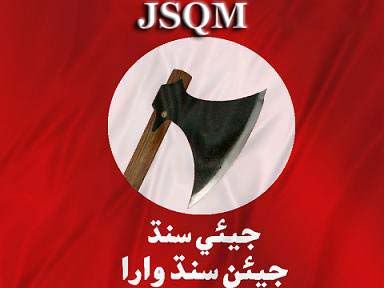
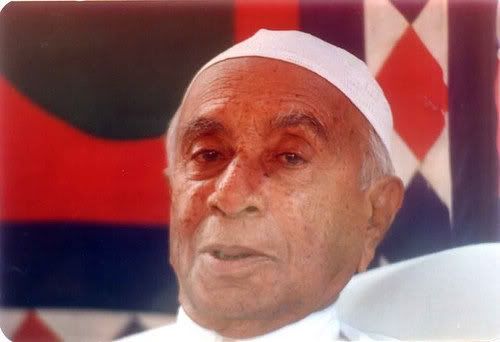
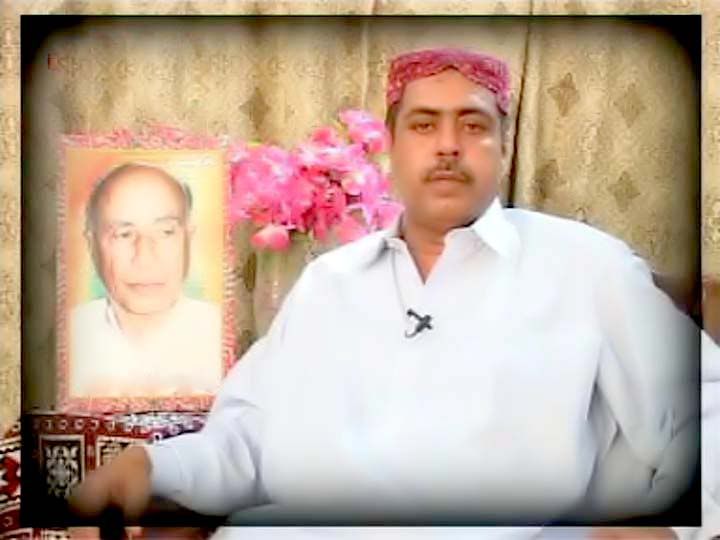
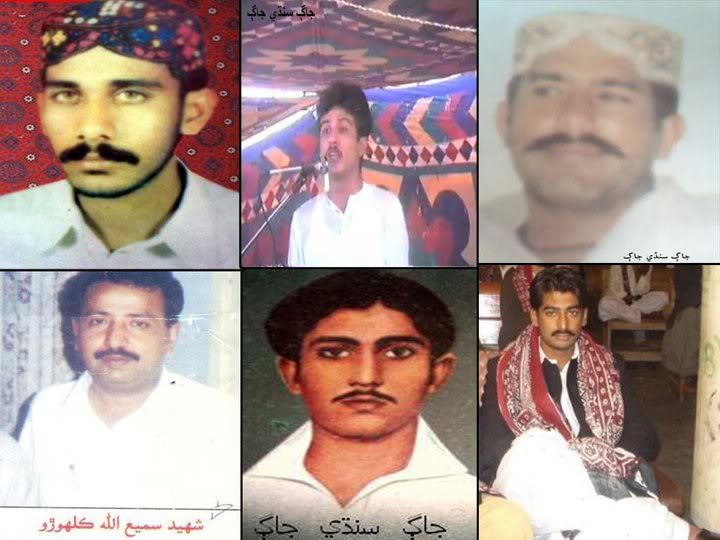
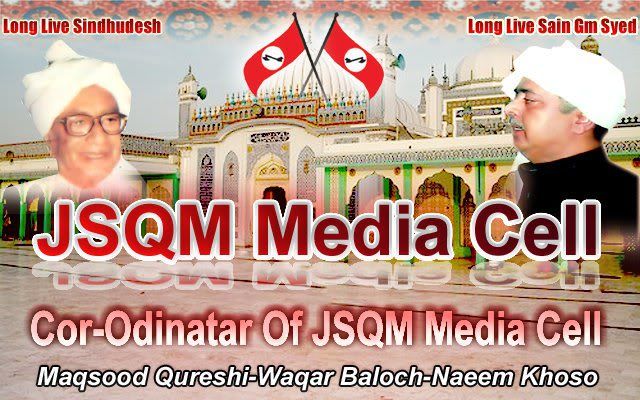



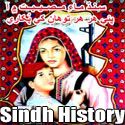






Currently have 0 comments: